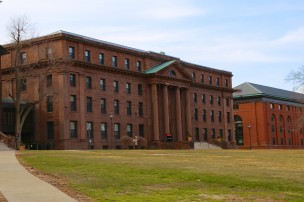Taking steps to rectify the issues surrounding diversity at the University, the Wesleyan Student Assembly (WSA) has proposed a resolution that requires all faculty members to undergo annual mandatory diversity training.
Earlier in the academic year, WSA President Nicole Updegrove ’14, introduced a five-part Privilege and Policy discussion series. Throughout these talks, students and faculty members had conversations regarding the impacts of privilege–class, gender, religion, race, ability, and wellness–at the University. Updegrove noted that she recognized a common theme in each of the five forums.
“[The idea of this resolution] came from the Privilege and Policy talks,” Updegrove said. “[The issues surrounding] diversity came up at all of the five forums. This resounding theme cannot be ignored.”
The resolution will require that all members of the faculty receive educational guidance in the areas of sensitivity and diversity each year. The main intention is that the ideals brought forth in this training will be carried into the classroom setting. Updegrove noted that the goal is for faculty to preserve these values year after year and build on them with each training session.
“There are many discussions that take place on campus regarding these instances of discrimination, but it is often difficult to propose a clear solution,” said Chair for the Committee for Inclusion and Diversity Sadasia McCutchen ’17. “With this being said, I think that this proposal is an important one because it acknowledges the strong influence that faculty have as leaders in the community.”
Updegrove added that she anticipates that the mandated training would be an ongoing process rather than an unexciting six-hour seminar.
As of now, the WSA is unsure what exactly the resolution will entail. However, Updegrove explained that regardless of the training requirements, faculty members must continue to remain cognizant of these issues.
“I think diversity is something that people need to educate themselves on and remind themselves about everyday,” Updegrove said. “Everyone is so wrapped up in their research and teaching, but there are a lot of things going on under the surface with students that professors should be sensitive toward.”
McCutchen added that it is pertinent to recognize that discrimination does arise on campus.
“Recognizing that there are instances of discrimination that happen on campus, whether these be intentional or otherwise, work must be done to provide a solution to these issues,” McCutchen said.
Updegrove also explained that this training is intended to not violate the rights of faculty to self-govern in their teaching. Rather, it will be sure to promote values that will help students in the classroom.
“Diversity education is useful for everybody, including faculty,” said WSA Vice President Andrew Trexler ’14. “The difficulty will be in making it mandatory, as the faculty only very recently mandated sexual harassment training despite many years of movement in that direction.”
McCutchen also explained that by presenting this resolution, there is an opening for faculty to reflect on the issues concerning diversity and sensitivity at the University.
“This should be an opportunity for faculty to consider the incidents of insensitivity that students have experienced in the classroom and to use these accounts to ensure that they do not replicate those actions,” McCutchen said.
The WSA distributed an all-campus poll on Wednesday, March 26 that asked students for their opinion regarding the mandated diversity training.
“[We asked] if [students think that] professors should be educated on the sensitivity of diversity and equity, and whether or not that training would have benefitted their education,’ Updegrove said. “We want to hear everyone’s opinion.”
McCutchen noted that she believes there will be many benefits from this new resolution. However, she recognized that introducing it might be a challenge.
“I notice that this work is not easy because it is acutely difficult to reverse oppressive structures and norms,” McCutchen said. “My hope is that this training is not teaching faculty to be sensitive, but rather encouraging them to see where they have not been sensitive and to improve in those areas. If this is the mission that is being fulfilled through this proposal, then I support it.”
-
Anonymous
